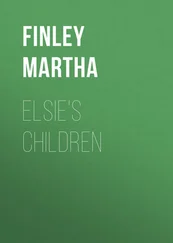She sat down, and stepping to her side he made a brief and simply worded address on the necessity of repentance and faith in Jesus, "the only Saviour of sinners," His willingness to save all who come to Him, and the great danger of delay in coming. Then with a short prayer and the singing of a hymn, they were dismissed.
With murmured thanks and many a backward look of admiring love at their already almost idolized young mistress, and her father, who had won their thorough respect and affection years ago, they scattered to their homes.
"You must have a shawl and hat, for the air begins to grow cool," said Mr. Dinsmore to his daughter.
"Yes, massa, I'se brought dem," said Chloe, hurrying up almost out of breath, with the required articles in her hand.
"Thank you, mammy, you are always careful of your nursling;" Elsie said, smilingly, as the shawl was wrapped carefully about her shoulders and the hat placed upon her head.
Her father drew her hand within his arm and led her across the lawn.
"There is one spot, very dear to us both, which we have not yet visited," he said, low and feelingly, "and I have rather wondered at your delay in asking me to take you there."
She understood him. "Yes, sir," she said, "I should have done so last evening, but that you looked weary. It has hardly been out of my mind since we came, and I have only waited for a suitable time."
"None could be better than the present," he answered.
On a gently sloping hillside, and beneath the shade of a beautiful magnolia, they found what they sought: a grave, with a headstone on which was carved the inscription:
"Fell asleep in Jesus,
March 15, 18—,
ELSIE, WIFE OF HORACE DINSMORE,
and only remaining child of
WILLIAM AND ELSPETH GRAYSON,
Aged 16 years, and 2 weeks.
'Blessed are the dead who die in the Lord.'"
They read it standing side by side.
"How young," murmured the daughter, tears filling her eyes, "how young to be a wife, a mother, and to die and leave husband and child! Oh, papa, how I used to long for her, and dream of her—my own precious mamma!"
"When, my darling?" he asked in moved tones, drawing her tenderly to him and passing an arm about her waist.
"Before I knew you, papa, and before you began to love me so dearly and be father and mother both, to me, as you have been for so many years," The low, sweet voice was tremulous with emotion, and the soft eyes lifted to his were brimming over with tears of mingled grief and joy, gratitude and love.
"I have tried to be," he said; "but no one could supply her place. What a loving, tender mother she would have been! But let us forget our loss in the bliss of knowing that it is so well with her."
It was a family burying-ground; there were other graves; those of our Elsie's grandparents, and several of their sons and daughters who had died in infancy or early youth; and in the midst uprose a costly monument, placed there by Mr. Grayson after the death of his wife. The spot showed the same care as the rest of the estate, and was lovely with roses and other sweet flowers and shrubs.
"My mother's grave!" said Elsie, bending over it again. "Papa, let us kneel down beside it and pray that we may meet her in heaven."
He at once complied with the request, giving thanks for the quiet rest of her who slept in Jesus, and asking that, when each of them had done and suffered all God's holy will here on earth, they might be reunited to her above, and join in her glad song of praise to redeeming love.
Elsie joined fervently in the "Amen," and rising, they lingered a moment longer, then wended their way in sweet and solemn silence to the house.
They sat together in the library after tea, each occupied with a book. But Elsie seemed little interested in hers, looking off the page now and then, as if in deep and troubled thought. At length closing it, she stole round to the side of her father's easy chair, and taking possession of a footstool, laid her head on his knee.
"I have my little girl again to-night," he said, passing his hand caressingly over her hair and cheek.
"I almost wish it was, papa."
"Why? is anything troubling you, dearest?" And he pushed his book aside, ready to give his whole attention to her.
"I am anxious about my poor people, papa; they are so ignorant of the truths necessary to salvation; and what can I teach them in three or four weeks? I have almost decided that I ought—that I must stay as many months."
"And that without even consulting your father? much less considering his permission necessary to your action?" Though the words seemed to convey reproach, if not reproof, his tone was gentle and tender.
"No, no, papa! I must cease to think it my duty if you forbid it."
"As I do most positively, I cannot stay, and I should never think for a moment of leaving you here!"
"But, papa, how then am I to do my duty by these poor ignorant creatures? how can I let them perish for lack of knowledge whom Christ has put into my care?"
"Procure a chaplain, who shall hold regular services for them every Sabbath, and do pastoral work among them through the week. You will not grudge him his salary."
"Papa, what an excellent idea! Grudge him his salary? No, indeed; if I can get the right man to fill the place, he shall have a liberal one. And then he will be a check upon Mr. Spriggs, and inform me if the people are abused. But how shall I find him?"
"What do you do when in want of something you do not know exactly how to procure?"
"Pray for direction and help," she answered, low and reverently.
"We will both do that, asking that the right man may be sent us; and I will write to-morrow to some of the presidents of the theological seminaries, asking them to recommend some one suited for the place."
"Papa," she cried, lifting a very bright face to his, "what a load you have taken from my mind."
Table of Contents
"A mighty pain to love it is
And 'tis a pain that pain to miss;
But of all pains, the greatest pain
It is to love, but love in vain."
—COWLEY.
One lovely afternoon in the second week of their stay at Viamede, Mr. Dinsmore and his daughter were seated in the shade of the trees on the lawn, she busied with some fancy-work while her father read aloud to her.
As he paused to turn a leaf, "Papa," she said, glancing off down the bayou, "there is a steamer coming, the same that brought us, I think; and see, it is rounding to at our landing. Can it be bringing us a guest?"
"Yes, a gentleman is stepping ashore. Why, daughter, it is Harold Allison."
"Harold! oh, how delightful!" And rising they hastened to meet and welcome him with truly Southern warmth of hospitality.
"Harold! how good of you!" cried Elsie. "Mamma wrote us that you were somewhere in this region, and if I'd had your address, I should have sent you an invitation to come and stay as long as possible."
"And you have done well and kindly by us to come without waiting for that," Mr. Dinsmore said, shaking the hand of his young brother-in-law with a warmth of cordiality that said more than his words.
"Many thanks to you both," he answered gayly. "I was conceited enough to feel sure of a welcome, and did not wait, as a more modest fellow might, to be invited. But what a lovely place! a paradise upon earth! And, Elsie, you, in those dainty white robes, look the fit presiding genius."
Elsie laughed and shook her head. "Don't turn flatterer, Harold; though I do not object to praise of Viamede."
"I have not heard from Rose in a long time," he said, addressing Mr. Dinsmore. "She and the little folks are well, I hope?"
"I had a letter this morning, and they were all in good health when it was written."
Читать дальше












